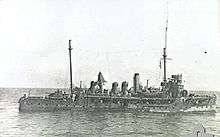Herbert King-Hall
Admiral Sir Herbert Goodenough King-Hall, KCB, CVO, DSO (15 March 1862 – 20 October 1936) was a Royal Navy officer who went on to be Commander-in-Chief, Cape of Good Hope Station.
Sir Herbert King-Hall | |
|---|---|
| Born | 15 March 1862 |
| Died | 20 October 1936 (aged 74) |
| Allegiance | |
| Service/ | |
| Years of service | 1875–1919 |
| Rank | Admiral |
| Commands held | HMS Endymion HMS Indomitable Cape of Good Hope Station |
| Battles/wars | Anglo-Egyptian War Second Boer War World War I |
| Awards | Knight Commander of the Order of the Bath Commander of the Royal Victorian Order Distinguished Service Order |
Naval career
Born the son of Admiral Sir William King-Hall, Herbert King-Hall joined the Royal Navy in 1875.[1] He fought in the Anglo-Egyptian War in 1882,[1] and later commanded the special service vessel HMS Hearty. Promoted to Captain in 1900, he took part in the Second Boer War and was mentioned in despatches.[1] After the war ended in June 1902, King-Hall stayed in South Africa as Principal Transport Officer at Cape Town.[2] He was appointed in command of HMS Endymion in 1903.[3] King-Hall was appointed Assistant Director of Naval Intelligence in 1905[4] and was given command of HMS Indomitable in 1908.[3] Promoted to Rear-Admiral in 1909, he became Second-in-Command of the 2nd Battle Squadron[5] before being appointed Commander-in-Chief, Cape of Good Hope Station in 1913 and serving in that role during World War I.[6] He led the operation to successfully destroy and then sink SMS Königsberg on the Rufiji River in Tanzania in July 1915.[7] He was appointed a Knight Commander of the Order of the Bath in the 1916 New Year Honours. His last appointment was as Admiral Commanding, Orkneys and Shetlands in 1918.[3]

Family
In 1905 he married Lady Mabel Emily Murray, daughter of Viscount Stormont (son of William Murray, 4th Earl of Mansfield).[1] His older brother was Admiral Sir George King-Hall, his nephew the naval officer, writer, politician and playwright Stephen King-Hall, his niece the novelist, journalist and children's fiction writer Magdalen King-Hall.[8]
References
- "Person Page". thepeerage.com.
- "Naval & Military intelligence". The Times (36897). London. 13 October 1902. p. 7.
- "6924-CAREER OF HERBERT KING-HALL - King Hall Connections". sites.google.com.
- Naval and Military Intelligence, The Times, 9 March 1905
- HMS Orion, Portsmouth 1912 Maritime Prints
- Simonstown Historical Society Archived 4 November 2010 at the Wayback Machine
- "Great War Riverine Actions (Part 3 – Big Game Hunting in German East Africa) By Simon Stokes" (PDF). Archived from the original (PDF) on 14 July 2011. Retrieved 24 October 2010.
- King-Hall, Stephen. My Naval Life. Faber & Faber, 1952, p 15ff.
| Military offices | ||
|---|---|---|
| Preceded by Captain Stuart Nicholson |
Assistant Director Naval Intelligence (Foreign division) 1906–1908 |
Succeeded by Captain William Lowther Grant |
| Preceded by Sir Paul Bush |
Commander-in-Chief, Cape of Good Hope Station 1913–1916 |
Succeeded by Sir Edward Charlton |
| Preceded by Sir Frederic Brock |
Admiral Commanding, Orkneys and Shetlands 1918–1919 |
Succeeded by Sir Robert Prendergast |